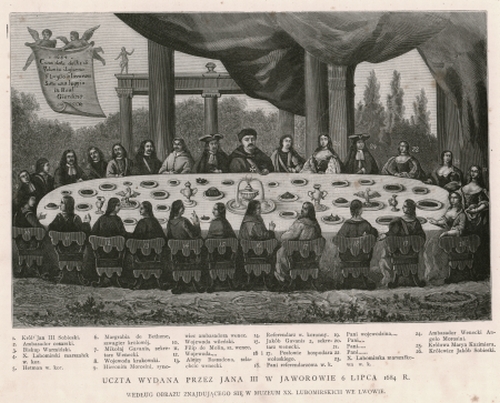
Much has been written about the feasts of the gentry: descriptions of exorbitant and magnificent banquets convey images of ventures that often financially ruined the host. The imagination of the seventeenth- and eighteenth-century lords was boundless, and the impetus with which the guests were received – enormous.
Reprehensible dissipation was linked with a wish not only to serve fitting meals but predominantly to demonstrate the splendour of the manor house in which the guests were entertained. The very organisation of a banquet took up much time and effort. The host was obligated to prepare the most comfortable conditions possible, and was bound – even if only due to his status – to perform all his responsibilities on time and meticulously.
We learn about the tasks shouldered by the host from a seventeenth-century guidebook by Stanisław Hercius: Bankiet Narodowi ludzkiemu od Monarchy Niebieskiego zaraz przy stworzeniu świata z różnych ziół, zbóż, owoców, bydląt, zwierzyn, ptactwa, ryb, etc. zgotowany. Których każdy z osobna, zdrowiu ludzkiemu służących i szkodliwych, własność, krótko w tej książeczce z różnych autorów zebrane i opisanie znajdziesz - a collection of advice concerning nourishment, diets and home economics as well as a sui generis introduction to savoir-vivre. The ideal host, according to Hercius, was not only capable of administering his estate and suitably acting towards his wife, family and servants but also of welcoming his guests and treating them in such a fashion that they would not feel neglected for even a single moment.
Amidst multiple pieces of advice, the author drew attention to the fact that the head of the household, the husband and the father should never make decisions alone but always seek the counsel of his spouse, particularly prior to receiving guests: “If he would like to spend some free time with friends and invite them to his home, he should first talk about this with his wife”.
The ideal host should arrange the whole household, conscious of the slightest detail: “To take care of the stable, the barn, the storeroom and the cellars as well as his own and hired servants, well before issuing the invitation. To get rid of flies and fleas if they occur in the chambers, according to prescribed methods. To prepare white cloths for the tableware and to boil water. To chase away bushy-tailed dogs from the hall”.
The duties of the perfect host did not end with preparations for the banquet. In the course of the reception – which could last for hours or even days - he was expected to take good care of the arrivals. Rendering the time spent together more interesting involved, i.a. the creation of an exceptional ambiance. Fun, conversation, music and food should be well planned in advance. Receiving guests was a sui generis exam to be passed by the host not only in their presence, but primarily that of the Creator. After all, while creating the world, God in His generosity remembered the least detail: ‘Omnipotent God created the whole Machinery of the world and in it the mute farm and household animals, wild creatures, birds, fish trees, herbs and fruit, all useful: so that all would not be created to no avail”.
The ideal host portrayed by Hercius was not only supposed to greet his guests as is due, but also to take care that all dishes were cooked with their health in mind. The cited work is an instruction offering the seventeenth-century host a specific foundation. It certainly became the basis and inspiration of authors of eighteenth-century guides, and for hosts seeking knowledge – a veritable treasury of indispensable information.
We would like to inform that for the purpose of optimisation of content available on our website and its customisation according to your needs, we use information stored by means of cookies on the Users' end devices. You can control cookies by means of your Internet browser settings. Further use of our website without change of the browser settings means that you accept the use of cookies. For more information on cookies used by us and to feel comfortable about this subject, please familiarise yourselves with our Privacy Policy.
✓ I understand